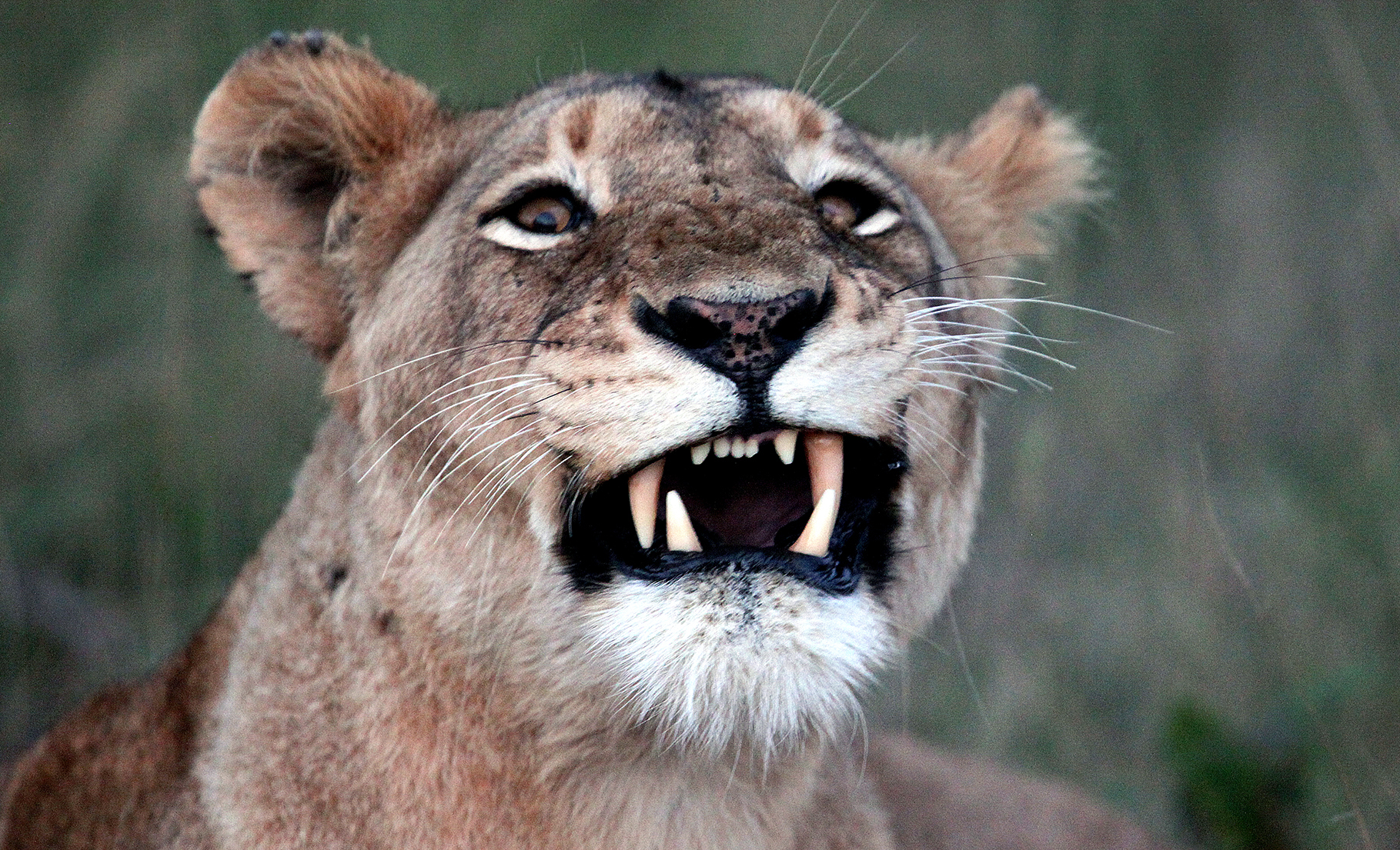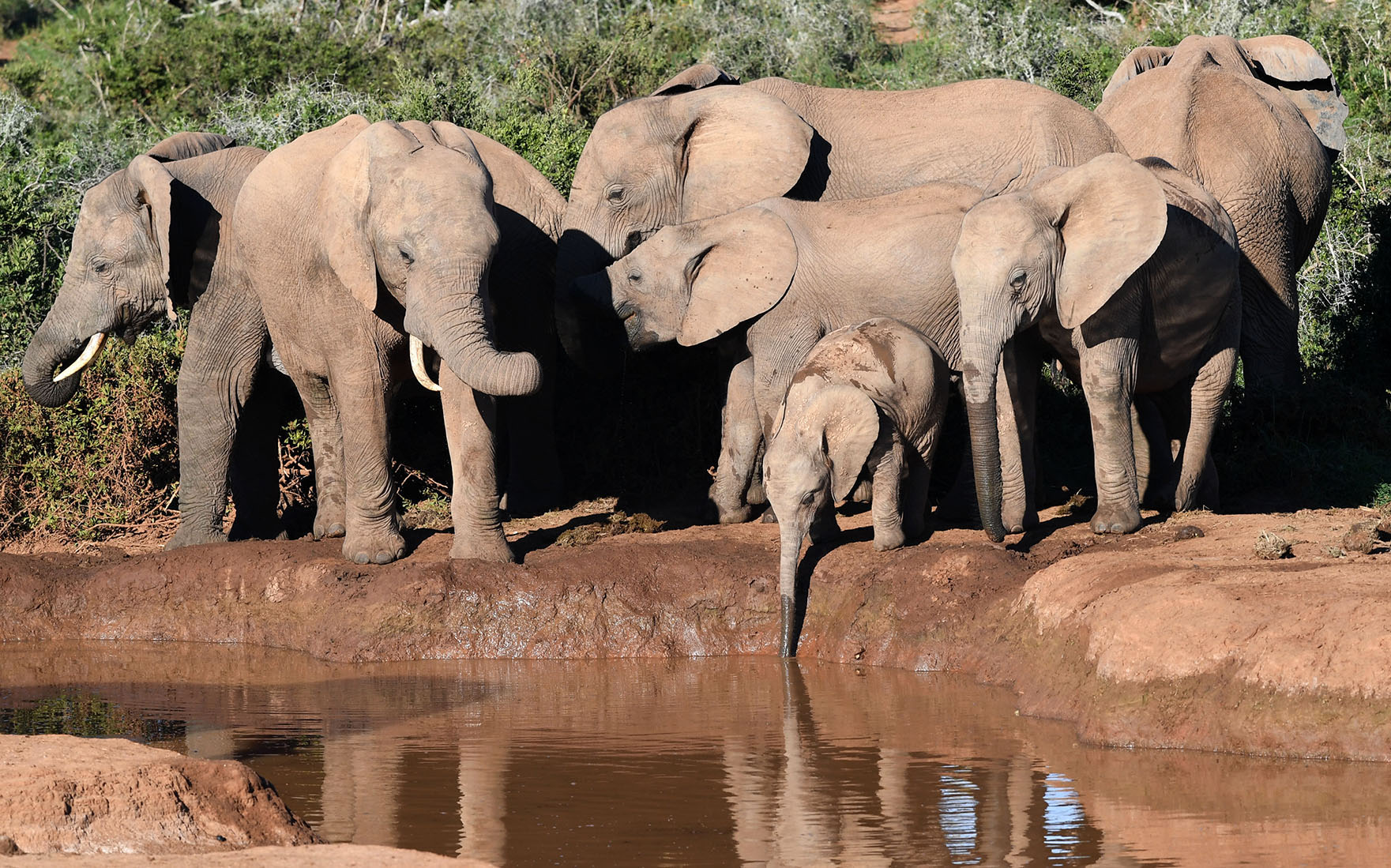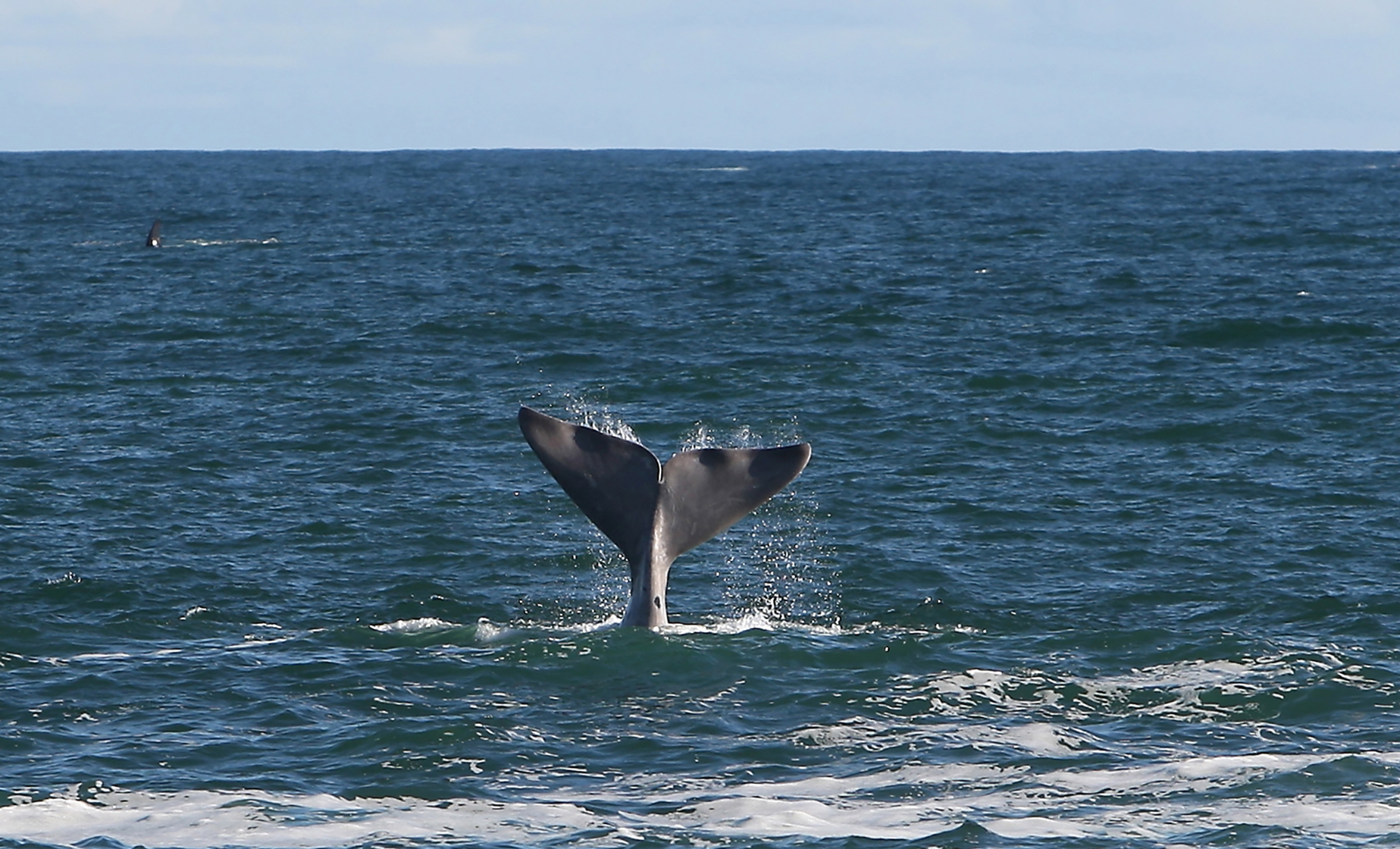‘We’ve lost half of the world’s warm water corals, and forests the size of roughly one football field vanish every two seconds.
“Wildlife populations have suffered a two-thirds decline globally in less than 50 years,” said Marco Lambertini, Director General of WWF International.
Like most conservation issues, biodiversity loss might be one of those far-off issues that you know you should care about, but if you’re being honest, you don’t have the capacity to think about right now.
But biodiversity is something we are going to have to make room for because it is about supporting life on earth — and that includes us.
 A lioness at the Sabi Sands nature reserve in the Kruger National Park. The WWF has reported a devastating 69% drop in wildlife populations since 1970. (Photo: Gallo Images / Sunday Times / Raymond Preston)
A lioness at the Sabi Sands nature reserve in the Kruger National Park. The WWF has reported a devastating 69% drop in wildlife populations since 1970. (Photo: Gallo Images / Sunday Times / Raymond Preston)
Biodiversity is about the loss of species — the WWF reported a devastating 69% drop in wildlife populations since 1970 — but degrading ecosystems also affect climate change and jeopardise natural processes that protect human health and provide clean air, water and food.
Fun fact: more than half of the world’s GDP — a cool $44-trillion of economic value generation — is moderately or highly dependent on nature and its services.
One of the most pivotal negotiations for biodiversity is about to get under way in Montreal, Canada.
The 15th Conference of Parties (COP15) for the United Nations Convention of Biological Diversity will see 196 parties negotiate a “Paris Agreement” for biodiversity, with the main goal of reversing biodiversity loss through measurable actions in the coming decades.
First, what is a COP?
COP has nothing to do with the police — rather, it stands for Conference of the Parties.
So COP15 is where parties (196 states) — part of the international environmental treaty called the Convention of Biological Diversity (CBD) — will convene for the 15th time since the treaty was established in 1992.
The Convention on Biology Diversity is explained as a treaty that “recognises that biological diversity is about more than plants, animals and microorganisms and their ecosystems — it is about people and our need for food security, medicines, fresh air and water, shelter, and a clean and healthy environment in which to live”.
Interestingly, every member of the United Nations (including SA), has adopted the CBD — with the exception of the United States.
Now, this is not to be confused with COP27, which was the 27th Conference of the Parties of the international environmental treaty called the United Nations Framework Convention on Climate Change (UNFCCC), held in Egypt last month.
https://www.dailymaverick.co.za/article/2022-11-20-cop27-makes-history-with-agreement-on-loss-and-damage-fund-for-vulnerable-countries-impacted-by-climate-change/
Read more in Daily Maverick: “COP27 ‘failed to reflect the urgency of the global climate crisis’ ”
If you’re confused, just remember that COP27 — which has the media and public’s attention (sometimes controversially) — is about climate change.
This conference, COP15, is about biodiversity — not as well attended by heads of state, but still super important.
It’s meant to happen every two years but has been delayed and rescheduled because of the pandemic, and will be the biggest biodiversity conference in the past decade.
Paris agreement for biodiversity
The reason this conference is of particular importance is that parties will seek to negotiate and agree upon the Post-2020 Global Biodiversity Framework (GBF) — a document that experts have been working on for years.
At a media briefing last month, Elizabeth Maruma Mrema, executive secretary of the CBD, said they are looking at this framework as “a Paris moment for biodiversity”.
Mrema was referring to the “Paris Agreement”, a legally binding international treaty on climate change that was signed by parties (including SA) at the UN climate change conference in 2015 (COP23) in Paris, with the main goal of limiting global warming from pre-industrial levels to 1.5°C and is seen as a landmark treaty.
The GBF is held in the same esteem because its nearly two dozen targets — which are ambitious, specific and measurable — hope to achieve what this convention has continually failed to do in the past: halt biodiversity loss.
In 2010, parties of CBD created 20 Aichi Biodiversity Targets, a 10-year plan for conserving biodiversity.
Unfortunately, none of those targets was fully achieved — in fact, indicators show biodiversity has further declined in the last decade, with around 1 million plant and animal species facing extinction.
 Indicators show biodiversity has further declined in the past decade, with around one million plant and animal species facing extinction. (Photo: Gallo Images / Lee Warren)
Indicators show biodiversity has further declined in the past decade, with around one million plant and animal species facing extinction. (Photo: Gallo Images / Lee Warren)
Twelve years later, experts hope to have learnt from their mistakes and have set these targets to be measurable, underpinned by science, and with explicit outcomes.
One of the most ambitious targets is the “30-by-30”, which aims to conserve 30% of land and 30% of seas globally by 2030.
Other mentionable targets include reducing the rate of introduction of invasive alien species by 50%, eradicating plastic waste, sustainable management of terrestrial and marine species that ensures vulnerable people benefit from nutrition, food security and medicine, and a financial target of $200-billion more in international financial flows for nature protection.
What’s important for South Africa?
Our Burning Planet previously reported, “Climate change and nature are inextricably linked — nature is impacted by climate change but is also part of the solution. The ongoing development of a global plan to protect biodiversity — the Post-2020 Global Biodiversity Framework – is a chance to optimise synergies for addressing the climate and biodiversity crises. The Biodiversity Summit (COP15) in Canada this month is one such chance.”
South African scientists and the government have emphasised that what will be important for SA in this conference are the links between climate change and biodiversity — and how they can help or harm one another.
https://www.dailymaverick.co.za/article/2022-11-30-sa-to-ask-for-more-money-at-upcoming-global-biodiversity-talks-as-at-cop27-hints-creecy/
The 2021 Biodiversity and Climate Change report co-sponsored by the Intergovernmental Science-Policy Platform on Biodiversity and Ecosystem Services (IPBES) and the Intergovernmental Panel on Climate Change (IPCC) emphasised that the previous separation of climate change and biodiversity “creates a risk of incompletely identifying, understanding and dealing with the connections between the two.
“In the worst case, it may lead to taking actions that inadvertently prevent the solution of one or the other, or both issues.”
The report acknowledges the very fact that the United Nations has two separate conferences for climate change (COP27, just held in Egypt) and biodiversity (this COP15), illustrates that these issues are not thought of in tandem.
The recent COP27 did acknowledge the link between biodiversity and climate change, but Nick Trisos, a senior researcher with the African Climate and Development Initiative at the University of Cape Town and coordinating lead author of the Africa chapter of the IPCC’s sixth assessment report, said it will be important to note if COP15 looks at how the issues of climate change and biodiversity are connected or act in a way that keeps them as divided issues for governments.
Nature-based solutions
“For example, a lot of developed countries are pushing for nature-based solutions to climate change, but some of these could be very harmful to biodiversity (eg, planting alien invasive trees in African savanna and grasslands) or they could be helpful (eg, protecting indigenous forests),” said Trisos.
At the 5th United Nations Environment Assembly (Unea 5) held in Kenya in February this year, “nature-based solutions” was formally defined as “actions to protect, conserve, restore, sustainably use and manage natural or modified terrestrial, freshwater, coastal and marine ecosystems, which address social, economic and environmental challenges effectively and adaptively, while simultaneously providing human wellbeing, ecosystem services and resilience and biodiversity benefits”.
It’s quite a long, and complex definition for a buzzword that many scientists, and governments — including our own — are sceptical of.
Climate scientist and acting director of the School for Climate Studies at Stellenbosch University, Prof Guy Midgley, also had concerns about the impacts of nature-based solutions on biodiversity.
“African negotiators must understand the risks of falling victim to afforestation efforts in naturally unforested ecosystems (like grasslands and savannas) that threaten to ruin indigenous biodiversity, ecosystem services and livelihoods across hundreds of thousands of hectares, for little potential carbon gain, and at knock-down prices for African countries,” said Midgley, who is an expert in biodiversity and listed among the top 1,000 most influential climate change scientists in the world on the Reuters Hot List.
Afforestation is planting forests in lands that don’t have trees, in an effort to remove carbon dioxide (a greenhouse gas that contributes to global warming).
So what these scientists are warning is that efforts to mitigate the climate crisis could put biodiversity at risk.
Mitigation is dealing with the source of the climate crisis either by stopping the production of greenhouse gases or increasing the sinks and carbon stocks (like trees) that can absorb them.
“Whether biodiversity and climate change are seen by policymakers as interconnected (or not) is a crucial factor in solving both challenges in a way that doesn’t do harm to biodiversity,” said Trisos.
Midgley also told OBP the IPBES-IPCC report is telling us that it’s imperative Africa be careful that our efforts to protect nature (conserve biodiversity) do not get in the way of mitigation efforts (decarbonising the world to prevent worsening climate change).
“That is, that industrialised nations do not use ‘nature-based solutions’ as a way to delay the urgent need for decarbonisation,” said Midgley.
Midgley elaborated that while the term “nature-based solutions” has its merits, the “so-called solutions” must be considered in the context of technical and technological responses.
Visit Daily Maverick’s home page for more news, analysis and investigations
Minister of Environment, Forestry and Fisheries, Barbara Creecy, addressed the debate around nature-based solutions during a national stakeholder engagement regarding her department’s position going into the biodiversity conference.
Creecy said that while the position of the SA government is that it supports ecosystem-based adaptation, there is a lot of talk in the international domain about nature-based solutions.
Regarding this outcome at Unea 5, Creecy somewhat cryptically said, “There needs to be an opportunity for the inter-governmental process on nature-based solutions to unfold — but what we’re not denying is that ecosystem conservation can help with adaptation and mitigation of climate change”.
Ecosystem-based adaptation, which the DFFE supports, is a subset of nature-based solutions — it’s more limited in scope as it focuses mainly on climate change adaptation.
Emma Archer, Professor of Geography and Environmental Science at the University of Pretoria, told OBP an important development for SA from this conference would be how we can “practically implement actions to ensure that healthy ecosystems can support both climate adaptation and mitigation — not just in rural areas, but also in cities”.
Daily Maverick will be attending COP15 in Montreal. Stay tuned. DM/OBP
This story was produced as part of Internews’ Earth Journalism Network Fellowship Programme to the CBD COP15 Summit in Montreal, Canada.




 Indicators show biodiversity has further declined in the past decade, with around one million plant and animal species facing extinction. (Photo: Gallo Images / Lee Warren)
Indicators show biodiversity has further declined in the past decade, with around one million plant and animal species facing extinction. (Photo: Gallo Images / Lee Warren) 